Unit 12 What did you do last weekend? 单元复习课件(共51张PPT)
文档属性
| 名称 | Unit 12 What did you do last weekend? 单元复习课件(共51张PPT) | 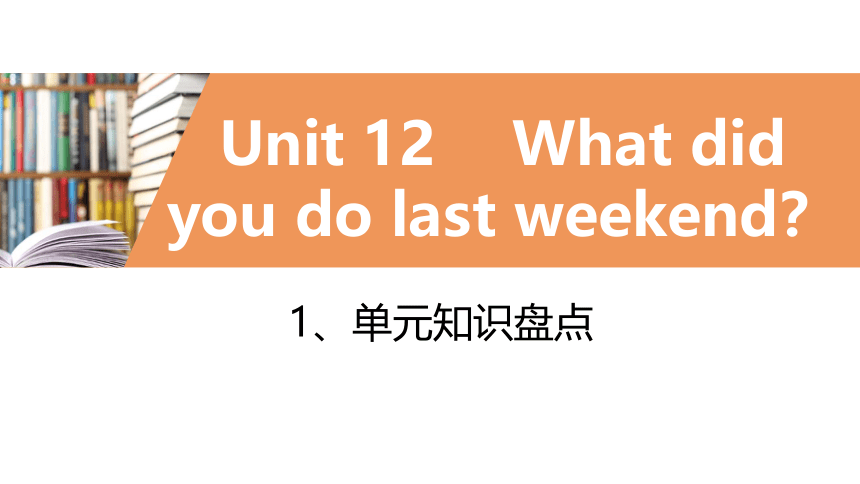 | |
| 格式 | pptx | ||
| 文件大小 | 467.3KB | ||
| 资源类型 | 教案 | ||
| 版本资源 | 人教新目标(Go for it)版 | ||
| 科目 | 英语 | ||
| 更新时间 | 2022-08-05 19:56:29 | ||
图片预览

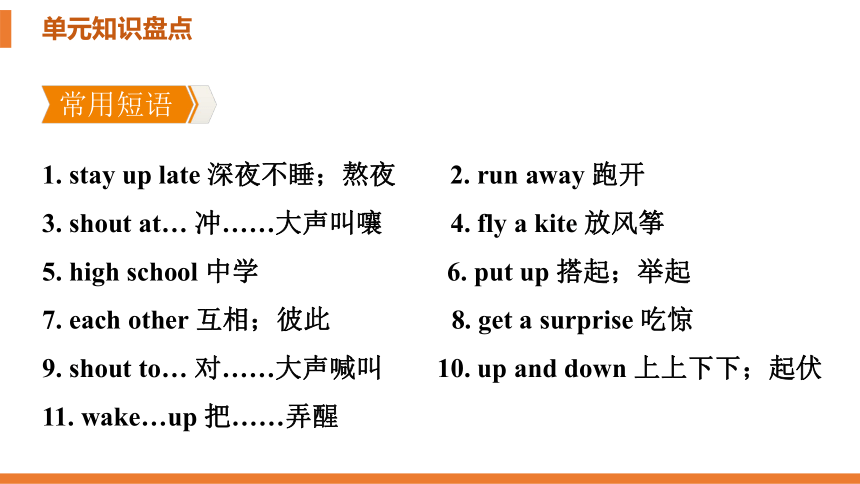
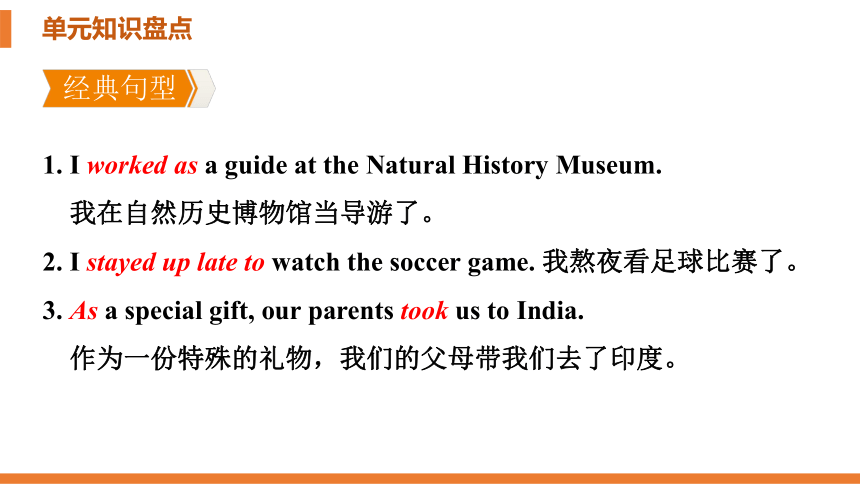
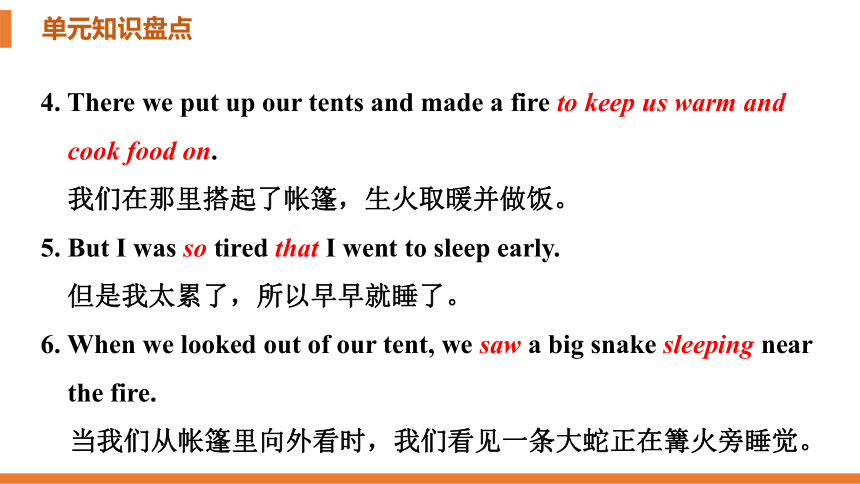
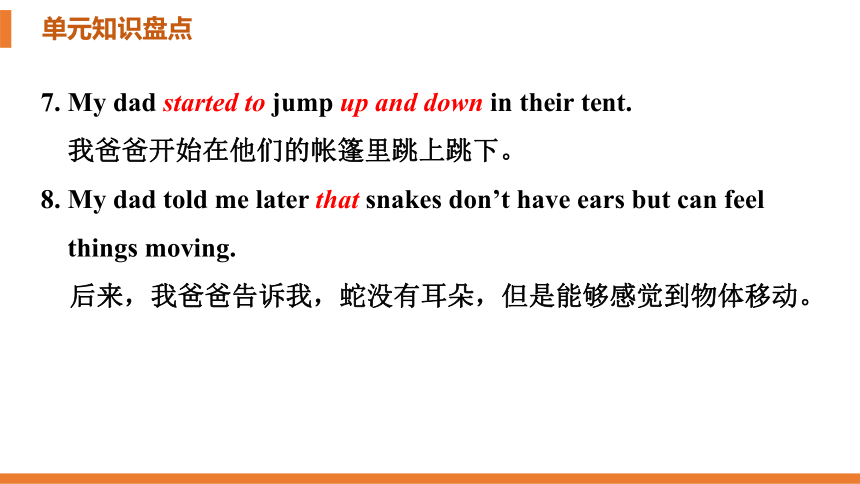
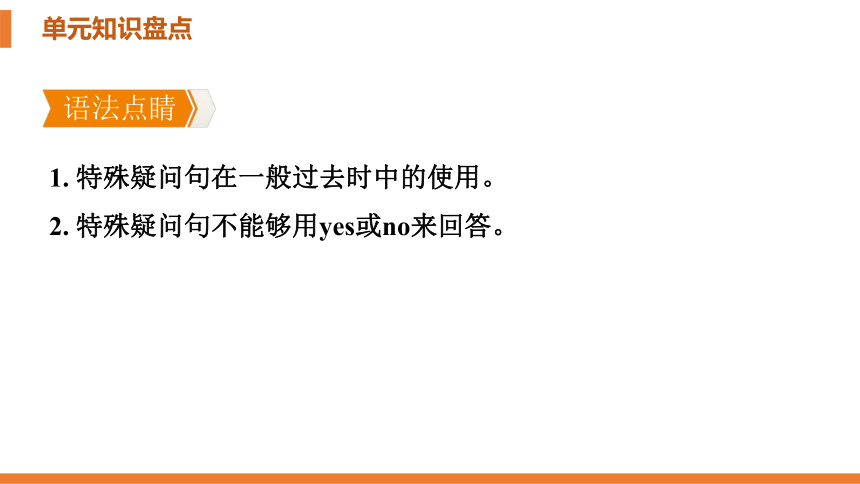
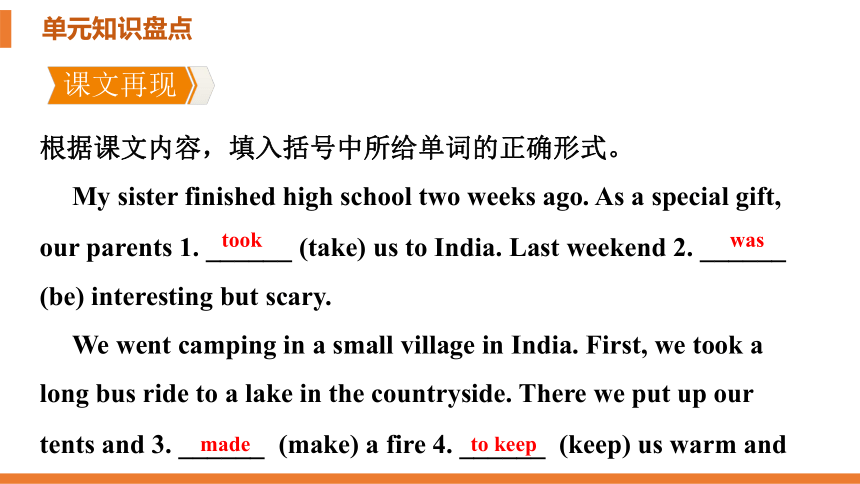
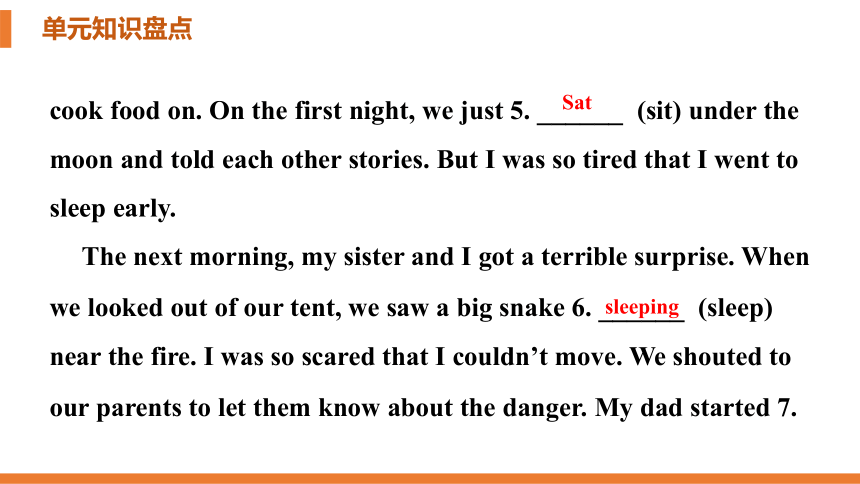
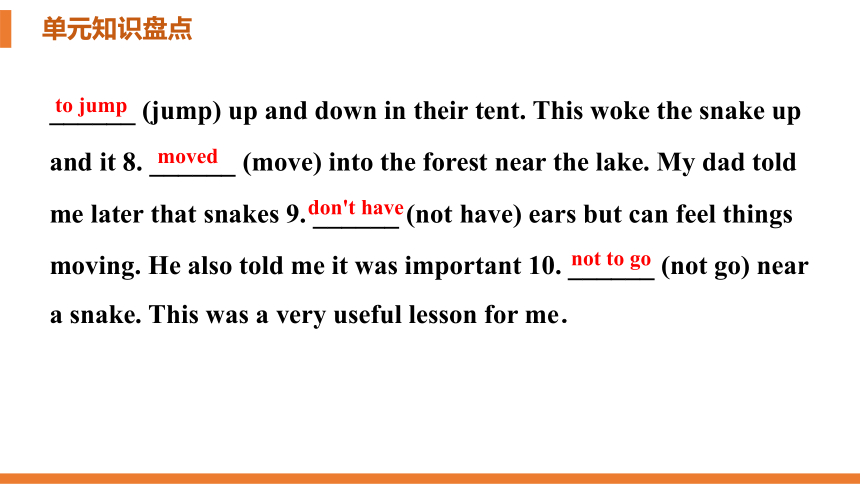
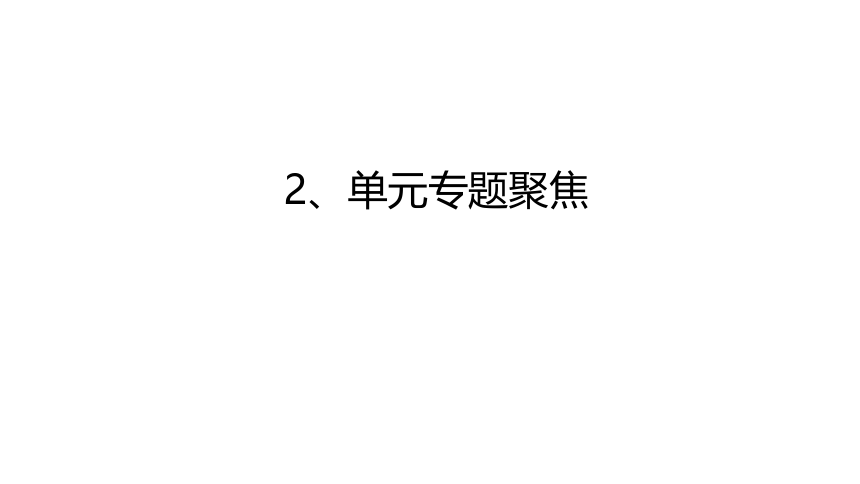
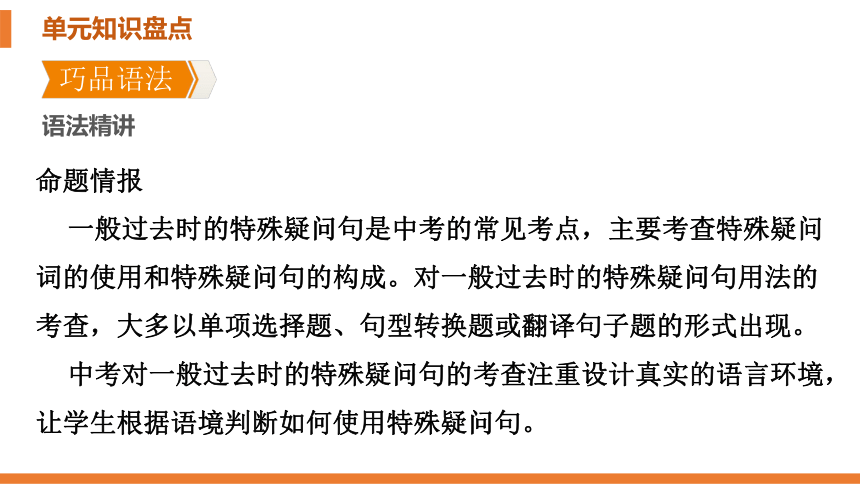
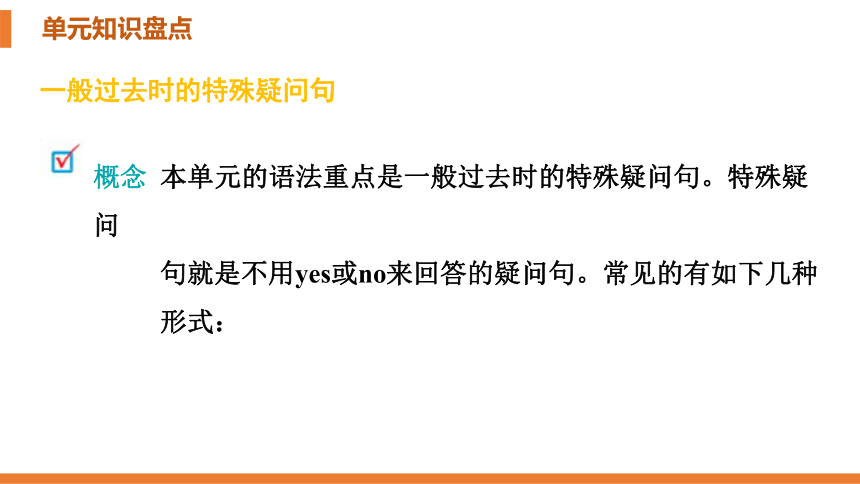
文档简介
(共51张PPT)
Unit 12 What did you do last weekend?
1、单元知识盘点
常用短语
1. stay up late 深夜不睡;熬夜 2. run away 跑开
3. shout at… 冲……大声叫嚷 4. fly a kite 放风筝
5. high school 中学 6. put up 搭起;举起
7. each other 互相;彼此 8. get a surprise 吃惊
9. shout to… 对……大声喊叫 10. up and down 上上下下;起伏
11. wake…up 把……弄醒
经典句型
1. I worked as a guide at the Natural History Museum.
我在自然历史博物馆当导游了。
2. I stayed up late to watch the soccer game. 我熬夜看足球比赛了。
3. As a special gift, our parents took us to India.
作为一份特殊的礼物,我们的父母带我们去了印度。
4. There we put up our tents and made a fire to keep us warm and
cook food on.
我们在那里搭起了帐篷,生火取暖并做饭。
5. But I was so tired that I went to sleep early.
但是我太累了,所以早早就睡了。
6. When we looked out of our tent, we saw a big snake sleeping near
the fire.
当我们从帐篷里向外看时,我们看见一条大蛇正在篝火旁睡觉。
7. My dad started to jump up and down in their tent.
我爸爸开始在他们的帐篷里跳上跳下。
8. My dad told me later that snakes don’t have ears but can feel
things moving.
后来,我爸爸告诉我,蛇没有耳朵,但是能够感觉到物体移动。
语法点睛
1. 特殊疑问句在一般过去时中的使用。
2. 特殊疑问句不能够用yes或no来回答。
课文再现
根据课文内容,填入括号中所给单词的正确形式。
My sister finished high school two weeks ago. As a special gift, our parents 1. ______ (take) us to India. Last weekend 2. ______ (be) interesting but scary.
We went camping in a small village in India. First, we took a long bus ride to a lake in the countryside. There we put up our tents and 3. ______ (make) a fire 4. ______ (keep) us warm and
took was
made to keep
cook food on. On the first night, we just 5. ______ (sit) under the moon and told each other stories. But I was so tired that I went to sleep early.
The next morning, my sister and I got a terrible surprise. When we looked out of our tent, we saw a big snake 6. ______ (sleep) near the fire. I was so scared that I couldn’t move. We shouted to our parents to let them know about the danger. My dad started 7.
Sat
sleeping
______ (jump) up and down in their tent. This woke the snake up and it 8. ______ (move) into the forest near the lake. My dad told
me later that snakes 9. ______ (not have) ears but can feel things moving. He also told me it was important 10. ______ (not go) near a snake. This was a very useful lesson for me.
to jump
moved
don't have
not to go
2、单元专题聚焦
巧品语法
语法精讲
命题情报
一般过去时的特殊疑问句是中考的常见考点,主要考查特殊疑问词的使用和特殊疑问句的构成。对一般过去时的特殊疑问句用法的考查,大多以单项选择题、句型转换题或翻译句子题的形式出现。
中考对一般过去时的特殊疑问句的考查注重设计真实的语言环境,让学生根据语境判断如何使用特殊疑问句。
一般过去时的特殊疑问句
概念 本单元的语法重点是一般过去时的特殊疑问句。特殊疑问
句就是不用yes或no来回答的疑问句。常见的有如下几种
形式:
1 what和一般过去时的搭配
结构:What+did+主语+动词原形+其他
用法:用于询问某人做了什么事。
—What did you do last night
你们昨天晚上做什么了?
—We watched TV at home.
我们在家看电视了。
2 who和一般过去时的搭配
有两种情形:
who在句中作主语 Who+动词的过去式+其他
who在句中作宾语 Who+did+主语+动词原形+其他 (此结构中的who可替换为whom)
—Who visited the teacher yesterday
昨天谁去看望老师了?
—Lisa did. 莉萨去了。
—Who/Whom did you go to Hong Kong with
你和谁一起去香港了?
—I went there with my parents.
我和我父母一起去的那里。
3 where和一般过去时的搭配
结构:Where+did+主语+动词原形+其他
用法:用于询问某人做某事的地点。
—Where did you go last week
上周你们去哪里了?
—We went to the farm.
我们去农场了。
4 when和一般过去时的搭配
结构:When+did+主语+动词原形+其他
用法:用于询问某人做某事的时间。
—When did they hold the party
他们什么时候举办的聚会?
—Last night.
昨天晚上。
5 why和一般过去时的搭配
结构:Why+did+主语+动词原形+其他
用法:用于询问某人做某事的原因。
—Why did you choose the red T-shirt
你为什么选择了那件红色的T恤衫?
—Because my mother loves red.
因为我妈妈喜欢红色。
6 how和一般过去时的搭配
结构:How+did+主语+动词原形+其他
用法:用于询问某人做某事的方式。
—How did you get to London
你们是怎么到伦敦的?
—By plane.
乘飞机。
Ⅰ. 单项选择
1. —______ did you write to last night
—A pen pal.
A. What B. When C. Whom
C
考点直击
【解析】由答语“一个笔友”可知,疑问词为whom。故选C。
2. —______ did you visit Taiwan with, Sarah
—My parents. We had a good time there.
A. What B. Who
C. Where D. When
B
3. —When ______ you _______ here
—Two days ago.
A. did; come B. have; come
C. will; come D. do; come
A
【解析】考查动词的时态。由答语“两天前”可知,问句的时态是一般过去时。故选A。
4. — ______ did you do last night
—I visited my grandparents with my mom.
A. What B. How
C. Where D. When
5. — ______ did the man go to India
—By train.
A. What B. Why
C. How D. Where
A
C
Ⅱ.对画线部分提问
1. They went to Yunnan last summer.
______ ______ they go to Yunnan
2. Sara was late for school because of the heavy rain.
______ ______ Sara late for school
3. They went to their hometown by train.
______ ______ they ______ to their hometown
When did
Why was
How did go
4. The boys played tennis at the stadium.
______ ______ the boys ______ tennis
5. They waited for me at the bus stop.
______ ______ they ______ ______ at the bus stop
Where did play
Who/Whom did wait for
Ⅲ. 翻译句子
1. 你上周末做什么了
__________________________________________
2. 她上个月去哪儿了
__________________________________________
3. 她和谁一起去的
__________________________________________
What did you do last weekend
Where did she go last month
Who/Whom did she go with
4. 今天上午她是什么时候到校的
__________________________________________
5. 你的学校郊游怎么样?
__________________________________________
When did she get to school this morning
How was your school trip
如何写好以“叙述过去发生的事情”为话题的文章
本单元的话题是“叙述过去发生的事情”,语法重点仍然是一般过去时。
叙述过去发生的事情要使用一般过去时。写作时要交代清楚事情发生的时间、地点和主要人物以及事件。
妙解写作
这样的文章通常分为三部分:
第一部分:交代时间、地点、人物和事件。
第二部分:详细叙述事情发生的经过和结果。
第三部分:发表对此事的看法和感受。
现在,就让我们结合实例一起来看一下如何写好此类文章吧。
写 作 案 例
请你根据下面的提示内容写一篇文章,描述上周日发生的一件事情。
1. 上周日下午你去看电影。
2. 你遇到了一个正在角落里哭泣的小女孩;询问之后得知,她找不到妈妈了。
3. 你想帮助她,于是把她带到了警察局。
4. 在警察局正好遇到了小女孩的妈妈。
要求:1. 词数:50—60词;2. 条理清晰,层次分明。
参考词汇:at the corner 在角落 cry 哭
素 材 积 累
词汇库
vacation 假期 tired 疲劳的 camp 野营
weekend 周末 park 公园 guide 导游
bored 无聊的 interesting 有趣的 trip 旅行
visit 参观 exciting 令人兴奋的 past 过去的
moving 令人感动的
短语箱
take photos 拍照
show…around 带领……参观
pay a visit to 参观
stay up 熬夜
put up 搭起;举起
have a good time 玩得高兴
in the countryside 在乡下;在农村
each other 彼此;互相
learn about 了解
all kinds of 各种各样的
句式链
① I went to Beijing last week. 上周我去北京了。
② I was tired but I felt proud. 我累,但是我感到骄傲。
③ I went up to the girl and offered to help her. 我走向那个女孩并主动提出要帮助她。
④ I stayed up late to watch the soccer game. 为了看足球赛,我熬夜到很晚。
⑤ The students with the teacher played on the beach.
学生们和老师在海滩上玩耍。
⑥ To my surprise, my father finished the work on time.
令我惊讶的是,我父亲按时完成了工作。
⑦ After climbing the mountain, she was very tired.
爬完山以后,她很累。
⑧ He came to China as a tourist five years ago.
他五年前以游客的身份来过中国。
五 步 妙 解
审
体裁 记叙文 话题 上周日发生的事情
时态 一般过去时 人称 第一、三人称
段落 布局 开头:交代时间、地点等。 主体:描述具体经过。 结尾:表达感受。 谴
(1)在电影院附近,我发现一个小女孩在角落里哭。
翻译此句:
_____________________________________________________
(2)她告诉我她找不到妈妈了。
翻译此句:
_____________________________________________________
Near the cinema, I found a little girl crying at the corner.
She told me that she couldn't find her mother.
(3)当她看到女儿,这位妈妈多么高兴啊!
翻译此句:
_____________________________________________________
(4)I missed the movie. I felt very happy.
用but将以上两个简单句合并为一个句子:
_____________________________________________________
How happy the mother was when she saw her daughter!
I missed the movie, but I felt very happy.
模
开篇点题
(基本要素)
详细描述
(具体经过)
It was ____ last Sunday.
I went to ___________________.
Near the cinema, I found ____________________.
I went up to her and asked her ____________.
She told me that __________________.
So I decided to help her. I took her to ____________.
When we got there, her mother _________.
How happy the mother was when ______________!
I missed _______, but I felt________.
sunny
the police station
she couldn't find her mother
the movies in the afternoon
a little girl crying at the corner
what was wrong
表达感受
(遗憾、快乐)
was there, too
she saw her daughter
the movie
very happy
It was sunny last Sunday. I went to the movies in the afternoon.
Near the cinema, I found a little girl crying at the corner. I went up to her and asked her what was wrong. She told me that she couldn’t find her mother. So I decided to help her. I took her to the police station. When we got there, her mother was there, too. How happy the mother was when she saw her daughter!
I missed the movie, but I felt very happy.
润
点
全文使用一般过去时叙述整个事件,开篇先点明事件发生的时间和地点,接着介绍了事件的经过和结果。整个叙述过程条理清晰,前后衔接自然。最后写自己的心情:I missed the movie, but I felt very happy. 前后呼应。文中巧妙地运用了find sb. doing sth., go up to, decide to do, take sb. to sp. 等搭配,称得上是一篇佳作。
小 试 身 手
今天是星期六,你和你的朋友去离家不远的河心小岛进行了一次野餐。请你根据提示词,写一篇词数在60—80之间的英语日记。要求表达准确,语意完整,语法正确。提示词须全部用上。
注意:1. 日记开头已给出,不计入总词数。
2. 提示词:island, far, middle, early, boat, sing, dance, lunch, football, late, tired, happy, wonderful
Saturday, May 5th Fine
Today, I went to the small island not far from my home with my friends. _______________________________________________
__________________________________________________________________________________________________________________________________________________________________
One possible version:
Saturday, May 5th Fine
Today, I went to the small island not far from my home with my friends. It's in the middle of the river. We had a picnic there.
We got up very early in the morning. We went to the island by boat. First, we sang and danced. Then we had lunch. After that, we played football. We went home very late. Though we were very tired, we still felt happy.
What a wonderful picnic we had today!
综合型任务型阅读解题技巧
综合型任务型阅读主要考查学生的英语基础知识、阅读理解、逻辑分析以及推理判断等语言综合运用能力。
培优课堂
做此类试题时,应该注意以下技巧:
【典例】
Norma went to bed. It was eleven o’clock. She turned off the light. She lay(躺) in bed. It was dark. It was quiet. She closed her eyes. She tried to sleep, but she couldn’t. She turned the light on. She opened her book. She started to read her book. It was a good book. She read one page. Then she read another page. After a while, she felt sleepy. She closed the book. She turned off the light. She closed her eyes. She went to sleep.
任务一:完成句子。
1. Norma went to bed at ________________________________.
2. Norma felt______ after reading the book.
任务二:回答问题。
3. Why did Norma read the book
____________________________________________________
11:00/eleven o’clock
sleepy
Because she couldn’t sleep.
任务三:判断正(T)误(F)。
4. Norma turned off the light twice. ( )
任务四:将下列句子改为一般疑问句。
5. She went to sleep.
____________________________________________________
T
Did she go to sleep
【答案与解析】
1. 11:00/eleven o’clock 由“Norma went to bed. It was eleven o’clock.”可知,她
是十一点上床睡觉的。
2. sleepy 由“After a while, she felt sleepy.”可知,读书后她感觉困了。
3. Because she couldn’t sleep. 由“She tried to sleep, but she couldn’t. She turned
the light on. She opened her book.”可以推断出她看书是因为她无法入睡。
4. T 由文中两次提到“She turned off the light.”可知。
5. Did she go to sleep 助动词did后面的动词使用动词原形,went的原形是go。
谢 谢 观 看!
Unit 12 What did you do last weekend?
1、单元知识盘点
常用短语
1. stay up late 深夜不睡;熬夜 2. run away 跑开
3. shout at… 冲……大声叫嚷 4. fly a kite 放风筝
5. high school 中学 6. put up 搭起;举起
7. each other 互相;彼此 8. get a surprise 吃惊
9. shout to… 对……大声喊叫 10. up and down 上上下下;起伏
11. wake…up 把……弄醒
经典句型
1. I worked as a guide at the Natural History Museum.
我在自然历史博物馆当导游了。
2. I stayed up late to watch the soccer game. 我熬夜看足球比赛了。
3. As a special gift, our parents took us to India.
作为一份特殊的礼物,我们的父母带我们去了印度。
4. There we put up our tents and made a fire to keep us warm and
cook food on.
我们在那里搭起了帐篷,生火取暖并做饭。
5. But I was so tired that I went to sleep early.
但是我太累了,所以早早就睡了。
6. When we looked out of our tent, we saw a big snake sleeping near
the fire.
当我们从帐篷里向外看时,我们看见一条大蛇正在篝火旁睡觉。
7. My dad started to jump up and down in their tent.
我爸爸开始在他们的帐篷里跳上跳下。
8. My dad told me later that snakes don’t have ears but can feel
things moving.
后来,我爸爸告诉我,蛇没有耳朵,但是能够感觉到物体移动。
语法点睛
1. 特殊疑问句在一般过去时中的使用。
2. 特殊疑问句不能够用yes或no来回答。
课文再现
根据课文内容,填入括号中所给单词的正确形式。
My sister finished high school two weeks ago. As a special gift, our parents 1. ______ (take) us to India. Last weekend 2. ______ (be) interesting but scary.
We went camping in a small village in India. First, we took a long bus ride to a lake in the countryside. There we put up our tents and 3. ______ (make) a fire 4. ______ (keep) us warm and
took was
made to keep
cook food on. On the first night, we just 5. ______ (sit) under the moon and told each other stories. But I was so tired that I went to sleep early.
The next morning, my sister and I got a terrible surprise. When we looked out of our tent, we saw a big snake 6. ______ (sleep) near the fire. I was so scared that I couldn’t move. We shouted to our parents to let them know about the danger. My dad started 7.
Sat
sleeping
______ (jump) up and down in their tent. This woke the snake up and it 8. ______ (move) into the forest near the lake. My dad told
me later that snakes 9. ______ (not have) ears but can feel things moving. He also told me it was important 10. ______ (not go) near a snake. This was a very useful lesson for me.
to jump
moved
don't have
not to go
2、单元专题聚焦
巧品语法
语法精讲
命题情报
一般过去时的特殊疑问句是中考的常见考点,主要考查特殊疑问词的使用和特殊疑问句的构成。对一般过去时的特殊疑问句用法的考查,大多以单项选择题、句型转换题或翻译句子题的形式出现。
中考对一般过去时的特殊疑问句的考查注重设计真实的语言环境,让学生根据语境判断如何使用特殊疑问句。
一般过去时的特殊疑问句
概念 本单元的语法重点是一般过去时的特殊疑问句。特殊疑问
句就是不用yes或no来回答的疑问句。常见的有如下几种
形式:
1 what和一般过去时的搭配
结构:What+did+主语+动词原形+其他
用法:用于询问某人做了什么事。
—What did you do last night
你们昨天晚上做什么了?
—We watched TV at home.
我们在家看电视了。
2 who和一般过去时的搭配
有两种情形:
who在句中作主语 Who+动词的过去式+其他
who在句中作宾语 Who+did+主语+动词原形+其他 (此结构中的who可替换为whom)
—Who visited the teacher yesterday
昨天谁去看望老师了?
—Lisa did. 莉萨去了。
—Who/Whom did you go to Hong Kong with
你和谁一起去香港了?
—I went there with my parents.
我和我父母一起去的那里。
3 where和一般过去时的搭配
结构:Where+did+主语+动词原形+其他
用法:用于询问某人做某事的地点。
—Where did you go last week
上周你们去哪里了?
—We went to the farm.
我们去农场了。
4 when和一般过去时的搭配
结构:When+did+主语+动词原形+其他
用法:用于询问某人做某事的时间。
—When did they hold the party
他们什么时候举办的聚会?
—Last night.
昨天晚上。
5 why和一般过去时的搭配
结构:Why+did+主语+动词原形+其他
用法:用于询问某人做某事的原因。
—Why did you choose the red T-shirt
你为什么选择了那件红色的T恤衫?
—Because my mother loves red.
因为我妈妈喜欢红色。
6 how和一般过去时的搭配
结构:How+did+主语+动词原形+其他
用法:用于询问某人做某事的方式。
—How did you get to London
你们是怎么到伦敦的?
—By plane.
乘飞机。
Ⅰ. 单项选择
1. —______ did you write to last night
—A pen pal.
A. What B. When C. Whom
C
考点直击
【解析】由答语“一个笔友”可知,疑问词为whom。故选C。
2. —______ did you visit Taiwan with, Sarah
—My parents. We had a good time there.
A. What B. Who
C. Where D. When
B
3. —When ______ you _______ here
—Two days ago.
A. did; come B. have; come
C. will; come D. do; come
A
【解析】考查动词的时态。由答语“两天前”可知,问句的时态是一般过去时。故选A。
4. — ______ did you do last night
—I visited my grandparents with my mom.
A. What B. How
C. Where D. When
5. — ______ did the man go to India
—By train.
A. What B. Why
C. How D. Where
A
C
Ⅱ.对画线部分提问
1. They went to Yunnan last summer.
______ ______ they go to Yunnan
2. Sara was late for school because of the heavy rain.
______ ______ Sara late for school
3. They went to their hometown by train.
______ ______ they ______ to their hometown
When did
Why was
How did go
4. The boys played tennis at the stadium.
______ ______ the boys ______ tennis
5. They waited for me at the bus stop.
______ ______ they ______ ______ at the bus stop
Where did play
Who/Whom did wait for
Ⅲ. 翻译句子
1. 你上周末做什么了
__________________________________________
2. 她上个月去哪儿了
__________________________________________
3. 她和谁一起去的
__________________________________________
What did you do last weekend
Where did she go last month
Who/Whom did she go with
4. 今天上午她是什么时候到校的
__________________________________________
5. 你的学校郊游怎么样?
__________________________________________
When did she get to school this morning
How was your school trip
如何写好以“叙述过去发生的事情”为话题的文章
本单元的话题是“叙述过去发生的事情”,语法重点仍然是一般过去时。
叙述过去发生的事情要使用一般过去时。写作时要交代清楚事情发生的时间、地点和主要人物以及事件。
妙解写作
这样的文章通常分为三部分:
第一部分:交代时间、地点、人物和事件。
第二部分:详细叙述事情发生的经过和结果。
第三部分:发表对此事的看法和感受。
现在,就让我们结合实例一起来看一下如何写好此类文章吧。
写 作 案 例
请你根据下面的提示内容写一篇文章,描述上周日发生的一件事情。
1. 上周日下午你去看电影。
2. 你遇到了一个正在角落里哭泣的小女孩;询问之后得知,她找不到妈妈了。
3. 你想帮助她,于是把她带到了警察局。
4. 在警察局正好遇到了小女孩的妈妈。
要求:1. 词数:50—60词;2. 条理清晰,层次分明。
参考词汇:at the corner 在角落 cry 哭
素 材 积 累
词汇库
vacation 假期 tired 疲劳的 camp 野营
weekend 周末 park 公园 guide 导游
bored 无聊的 interesting 有趣的 trip 旅行
visit 参观 exciting 令人兴奋的 past 过去的
moving 令人感动的
短语箱
take photos 拍照
show…around 带领……参观
pay a visit to 参观
stay up 熬夜
put up 搭起;举起
have a good time 玩得高兴
in the countryside 在乡下;在农村
each other 彼此;互相
learn about 了解
all kinds of 各种各样的
句式链
① I went to Beijing last week. 上周我去北京了。
② I was tired but I felt proud. 我累,但是我感到骄傲。
③ I went up to the girl and offered to help her. 我走向那个女孩并主动提出要帮助她。
④ I stayed up late to watch the soccer game. 为了看足球赛,我熬夜到很晚。
⑤ The students with the teacher played on the beach.
学生们和老师在海滩上玩耍。
⑥ To my surprise, my father finished the work on time.
令我惊讶的是,我父亲按时完成了工作。
⑦ After climbing the mountain, she was very tired.
爬完山以后,她很累。
⑧ He came to China as a tourist five years ago.
他五年前以游客的身份来过中国。
五 步 妙 解
审
体裁 记叙文 话题 上周日发生的事情
时态 一般过去时 人称 第一、三人称
段落 布局 开头:交代时间、地点等。 主体:描述具体经过。 结尾:表达感受。 谴
(1)在电影院附近,我发现一个小女孩在角落里哭。
翻译此句:
_____________________________________________________
(2)她告诉我她找不到妈妈了。
翻译此句:
_____________________________________________________
Near the cinema, I found a little girl crying at the corner.
She told me that she couldn't find her mother.
(3)当她看到女儿,这位妈妈多么高兴啊!
翻译此句:
_____________________________________________________
(4)I missed the movie. I felt very happy.
用but将以上两个简单句合并为一个句子:
_____________________________________________________
How happy the mother was when she saw her daughter!
I missed the movie, but I felt very happy.
模
开篇点题
(基本要素)
详细描述
(具体经过)
It was ____ last Sunday.
I went to ___________________.
Near the cinema, I found ____________________.
I went up to her and asked her ____________.
She told me that __________________.
So I decided to help her. I took her to ____________.
When we got there, her mother _________.
How happy the mother was when ______________!
I missed _______, but I felt________.
sunny
the police station
she couldn't find her mother
the movies in the afternoon
a little girl crying at the corner
what was wrong
表达感受
(遗憾、快乐)
was there, too
she saw her daughter
the movie
very happy
It was sunny last Sunday. I went to the movies in the afternoon.
Near the cinema, I found a little girl crying at the corner. I went up to her and asked her what was wrong. She told me that she couldn’t find her mother. So I decided to help her. I took her to the police station. When we got there, her mother was there, too. How happy the mother was when she saw her daughter!
I missed the movie, but I felt very happy.
润
点
全文使用一般过去时叙述整个事件,开篇先点明事件发生的时间和地点,接着介绍了事件的经过和结果。整个叙述过程条理清晰,前后衔接自然。最后写自己的心情:I missed the movie, but I felt very happy. 前后呼应。文中巧妙地运用了find sb. doing sth., go up to, decide to do, take sb. to sp. 等搭配,称得上是一篇佳作。
小 试 身 手
今天是星期六,你和你的朋友去离家不远的河心小岛进行了一次野餐。请你根据提示词,写一篇词数在60—80之间的英语日记。要求表达准确,语意完整,语法正确。提示词须全部用上。
注意:1. 日记开头已给出,不计入总词数。
2. 提示词:island, far, middle, early, boat, sing, dance, lunch, football, late, tired, happy, wonderful
Saturday, May 5th Fine
Today, I went to the small island not far from my home with my friends. _______________________________________________
__________________________________________________________________________________________________________________________________________________________________
One possible version:
Saturday, May 5th Fine
Today, I went to the small island not far from my home with my friends. It's in the middle of the river. We had a picnic there.
We got up very early in the morning. We went to the island by boat. First, we sang and danced. Then we had lunch. After that, we played football. We went home very late. Though we were very tired, we still felt happy.
What a wonderful picnic we had today!
综合型任务型阅读解题技巧
综合型任务型阅读主要考查学生的英语基础知识、阅读理解、逻辑分析以及推理判断等语言综合运用能力。
培优课堂
做此类试题时,应该注意以下技巧:
【典例】
Norma went to bed. It was eleven o’clock. She turned off the light. She lay(躺) in bed. It was dark. It was quiet. She closed her eyes. She tried to sleep, but she couldn’t. She turned the light on. She opened her book. She started to read her book. It was a good book. She read one page. Then she read another page. After a while, she felt sleepy. She closed the book. She turned off the light. She closed her eyes. She went to sleep.
任务一:完成句子。
1. Norma went to bed at ________________________________.
2. Norma felt______ after reading the book.
任务二:回答问题。
3. Why did Norma read the book
____________________________________________________
11:00/eleven o’clock
sleepy
Because she couldn’t sleep.
任务三:判断正(T)误(F)。
4. Norma turned off the light twice. ( )
任务四:将下列句子改为一般疑问句。
5. She went to sleep.
____________________________________________________
T
Did she go to sleep
【答案与解析】
1. 11:00/eleven o’clock 由“Norma went to bed. It was eleven o’clock.”可知,她
是十一点上床睡觉的。
2. sleepy 由“After a while, she felt sleepy.”可知,读书后她感觉困了。
3. Because she couldn’t sleep. 由“She tried to sleep, but she couldn’t. She turned
the light on. She opened her book.”可以推断出她看书是因为她无法入睡。
4. T 由文中两次提到“She turned off the light.”可知。
5. Did she go to sleep 助动词did后面的动词使用动词原形,went的原形是go。
谢 谢 观 看!
同课章节目录
- Unit 1 Can you play the guitar?
- Section A
- Section B
- Unit 2 What time do you go to school?
- Section A
- Section B
- Unit 3 How do you get to school?
- Section A
- Section B
- Unit 4 Don't eat in class.
- Section A
- Section B
- Unit 5 Why do you like pandas?
- Section A
- Section B
- Unit 6 I'm watching TV.
- Section A
- Section B
- Review of Units 1-6
- Unit 7 It's raining!
- Section A
- Section B
- Unit 8 Is there a post office near here?
- Section A
- Section B
- Unit 9 What does he look like?
- Section A
- Section B
- Unit 10 I'd like some noodles.
- Section A
- Section B
- Unit 11 How was your school trip?
- Section A
- Section B
- Unit 12 What did you do last weekend?
- Section A
- Section B
